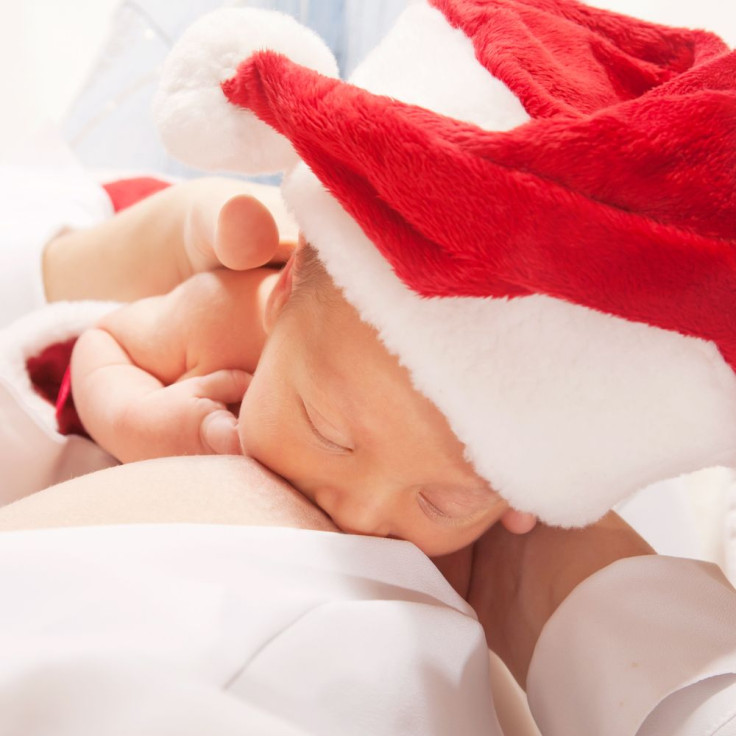Breastfeeding And Drinking: Important Information For New Moms To Consider Before Indulging In Eggnog This Holiday

There are many factors that play into whether or not a woman should drink alcohol while breastfeeding, and the only way for a new mother to definitively know if having a cocktail over the holiday could harm her newborn is by discussing the matter with her physician. If you’d like to have a better idea of what your doctor will advise you on the matter, here’s a quick run-through of information on breastfeeding and drinking.
Does Alcohol Increase Milk Flow?
In short, no alcohol does not aid in breastfeeding. Some cultures, such as in Mexico and Germany, believe alcohol can help increase the flow of milk in breastfeeding mothers, but this is only partially true. Mothers who drink beer before breastfeeding often do see an increase in milk production, but according to Health News, it’s the polysaccharides from the barley and hops in the beer, not the alcohol, that cause this effect. In other words, the same results could be seen if a mother were to drink a non-alcoholic beer or a milk-induction supplement.
Mothers who drink alcohol in an effort to feed their babies more milk may find that they’re actually doing quite the opposite. A hallmark study on the effects of alcohol and breastfeeding conducted in 1991 found babies drank up to 20 percent less breast milk if their mothers had ingested alcohol recently. The researchers concluded that the ethanol increased the intensity of the milk and thus caused the babies to suckle as much yet consume less.
“Although the mechanisms underlying this reduction in milk intake remain to be elucidated, this study shows that short-term alcohol consumption by nursing mothers has an immediate effect on the sensory characteristics (odor) of their milk and the feeding behavior of their infants,” wrote the scientists.
Facts On Drinking And Breastfeeding
Slate reported that when a woman drinks alcohol, the level of alcohol in her blood is roughly the same as the level of alcohol which will be in her milk. These levels peak and fall, just as those in your blood do, with peaks beginning about 30 to 45 minutes after you drink and dropping immediately after that. Technically speaking, once the mother is sobered up her milk will be alcohol-free. This means that there’s no need to pump and dump, unless it’s to relieve breast pains.
Although it's deemed all right for a woman to breastfeed once the alcohol has left her system, there are several factors that make it difficult to know precisely when this may be. First off, babies can’t break down alcohol as well as adults, so it takes less amounts to affect them. Also, “sobering up” does not work the same for everyone, and while one woman could take only an hour to clear the alcohol from her bloodstream, it could take another woman twice as long to break down the same amount of alcohol.
There is one interesting fact that works for the benefit of both Mommy and baby, however. Studies have shown that lactating mothers demonstrate significantly lowering levels of blood alcohol levels than non-lactating women. The biological reason for this is unknown.
What The Experts Say
“When you drink alcohol, it passes into your breast milk at concentrations similar to those found in your bloodstream. Although a breast-fed baby is exposed to just a fraction of the alcohol his or her mother drinks, a newborn eliminates alcohol from his or her body at only half the rate of an adult,” wrote Mayo Clinic lactation consultant Elizabeth LaFleur. “If you choose to drink, plan carefully to avoid exposing your baby to alcohol.”
Dr. Catherine Herway told similar advice to Health News, explaining: “If a mom is going to drink alcohol, she should wait at least three to four hours until breastfeeding the baby.”
Although these recommendations suggest that drinking and breastfeeding is okay, it’s still best to discuss with a medical professional what’s best for you and your baby.



























